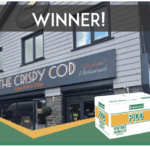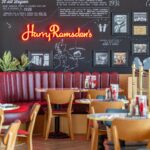With its 16th site due to open this month, Simone Varese, one of the directors behind Scotland’s growing fish and chip chain Blue Lagoon, talks about the opportunities and challenges his family business is facing
The very first Blue Lagoon opened its doors almost 50 years ago on Sauchiehall Street, now one of the main shopping streets in the centre of Glasgow. It was the result of years of hard work by Italian-born Ersilio Varese and childhood sweetheart Edda who built up enough capital running two chippies previously to take the gamble and follow their dream of opening in Glasgow.
At that time, there was a lot of competition in fish and chips and the area itself wasn’t the 24/7 hive of activity that it is today. The first two to three years were a struggle, but slowly the other chip shops disappeared, the flow of traffic in town started to move towards the area, and trade got better and better. Sauchiehall Street became a success and formed the foundations for future expansion across the city.
Over the years, shops have come and shops have gone, with the chain now sitting at an impressive 15. Many of these are now outside of Glasgow in cities such as Perth and Sterling, as well as coastal areas such as Largs, Ayr and Balloch near Loch Lomond, where the growth in tourists all craving fish and chips has provided clear opportunities to expand the business.
Run by third-generation brothers Simone, Allesandro and Gianluca Varese, they attribute much of the growth to their predecessors’ experiences which have taught them to work hard, save for a rainy day, maintain a healthy bank balance and not overspend.
“Both my grandfather and my father came into the business when it was a little bit of a struggle so they grew up in those darker days when the bank balance wasn’t always looking so healthy,” says Simone.
“We’ve grown up aware of that so we only spend when we know we can spend and we’re sensible about it. Before we take on another site and go from 14 to 15 to 16 we will do our due diligence to the point where we are as close as we can be to thinking right this will work. If there’s any doubt, we don’t take the plunge.”
That history and combined experience has also taught the family not to take anything for granted and that things can turn on sixpence.
“Look at what we’ve just been through,” says Simone. “Who would have thought the city centre would be shut down completely? Now we’re battling electricity prices and the cost of living. You don’t know what’s around the corner. But by and large, between working hard and the experience we have within the company, and the fact there are a few of us now all very much concentrated on what we’re doing, we’re managing to keep on a steady footing so far.”
Challenges
As with all of hospitality right now, Blue Lagoon is struggling with staffing, however, its business model makes it slightly tougher. Having built much of its business on the late-night market, Blue Lagoon has half a dozen shops in town open to 5am, seven days-a-week, and finding the workforce who want to do that regularly isn’t easy. But Simone has learnt not to let it get him down.
“Staffing is always an issue. But one of my father’s sayings whenever we’ve had our head in our hands because a couple of friers have left or a manager has left is that he’d never known a day where you don’t have a staffing issue somewhere of some degree. That’s just the way business is when you’re relying on other people to carry out your service, so to speak.”
The other ongoing challenge is rising energy bills with costs at one shop alone tripling from £500 a month to £1,500. While Simone welcomes the government’s initial help, he believes the industry desperately needs to cut business rates and VAT.
“There’s not much we can do. The lights have to go on, the pans have to be on otherwise you’re shut. But £1,500 a month, that’s, £15,000 at the end of the year right off your bottom line, that could be your profit margin there.
“It’s ridiculous that business rates have just bounced straight back up to 100% as if nothing ever happened. Some of the rates we pay on some of the sites are unbelievably unfair. It’s such a stranglehold around businesses. And if we could just get something off the VAT, even if it drops to 17.5%, it would help offset some of the other rising costs.
“We’ve put our prices up, but there’s a limit of how much you can go up when you’re selling at the lower end of the price market. We just can’t keep passing costs on to the customer.”
Traditional
The Blue Lagoon has developed a very distinct style of decor over the years, characterised by its bright neon lights and a tropical theme. In amongst this boldness, is still a traditional approach, with Simone shying away from the urge to invest in technology, such as self-service screens and apps.
“Anytime I pass a McDonald’s or Burger King, I stop and I can see why they’ve done what they have done because they don’t need as many people to do a job,” he says.
“We’ve not taken that step yet, a lot of our customers are the older generation so we would be a little bit wary to go overly technical at this stage, but as time passes, you never know. We’re quite old school in our service, I suppose. In our takeaway, you walk up to the counter, a human being will serve you, you sit in for something to eat, and someone will come to your table and provide table service. So we’re quite labour-heavy, but we’re hoping that is something that attracts people to us.”
Having built up a healthy business, Blue Lagoon is in a sound enough position financially where, despite the current challenges, it can invest when opportunities arise. Its most recent has been the purchase of a newsagents next to its takeaway in Gordon Street allowing it to expand into a 70-seater restaurant with a takeaway.
“We’ve always found that if you invest in a shop, you’ll get it back over time.
“With Gordon Street, we took the long-term view that we’ve been at that site for 15 years anyway so we knew it well enough to know that, albeit a gamble, it’s one worth taking. We knew what the flow of people was like, we knew the income we had there, the turnover that we had currently. It was more of an educated guess than had we been going somewhere completely new.”
With its 16th store due to open at the end of this year in Renfield Street, Glasgow, Simone says further shops are on the cards.
“We will keep opening if the right opportunities come up and as long as that base is looking good and things are running okay. We’ll continue to open sensibly though, we will never be a company that will open 10 shops in a row. At the most we might do two back-to-back to each other but no more than that.”









